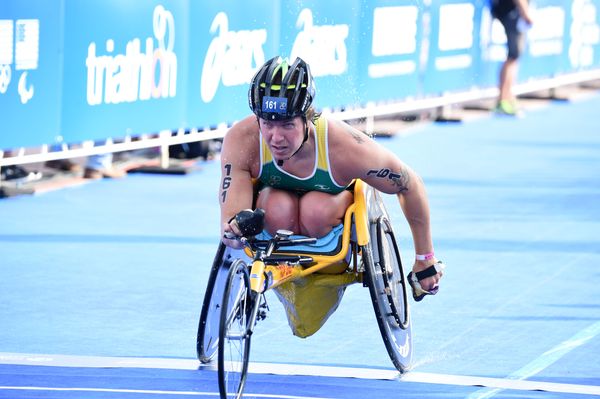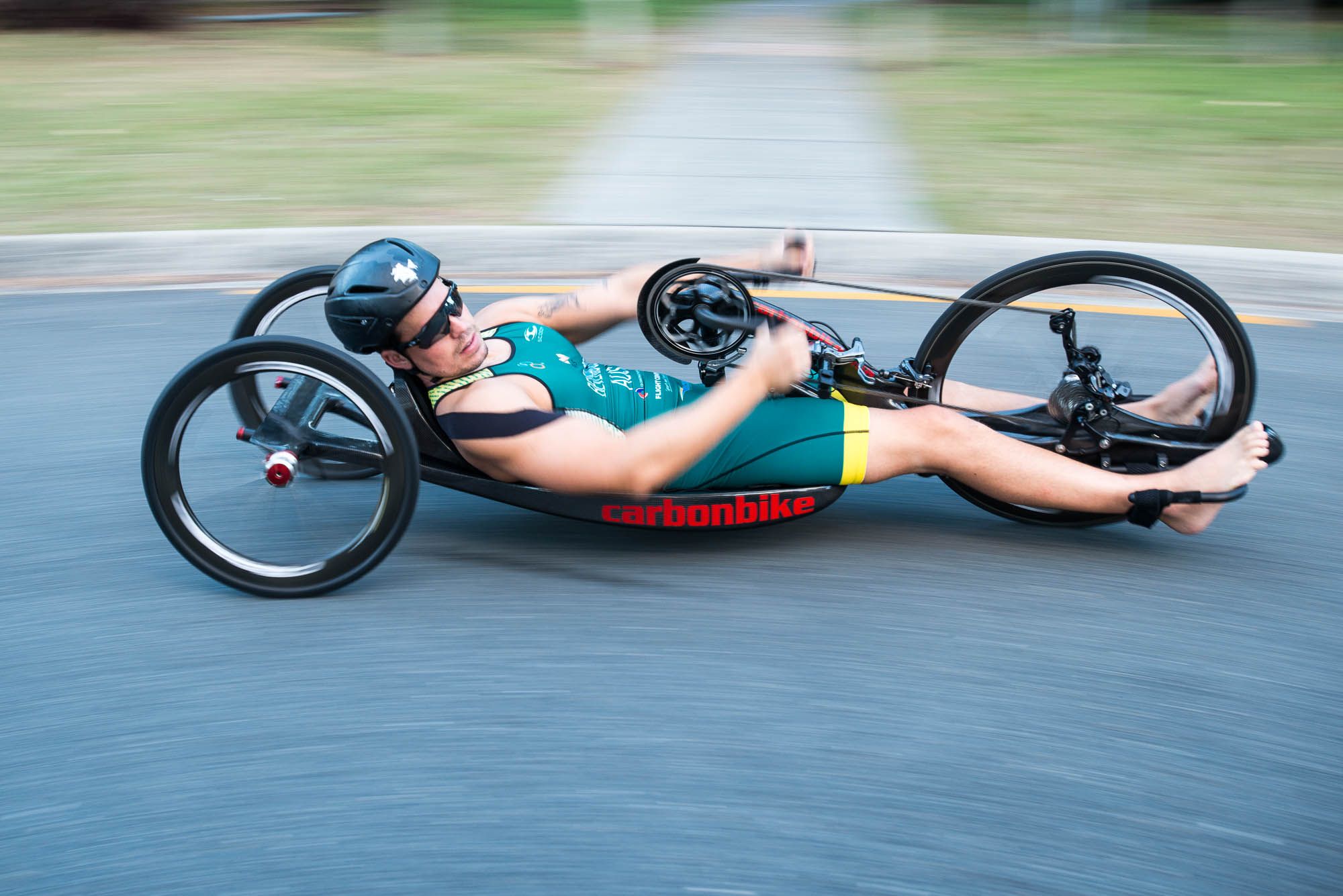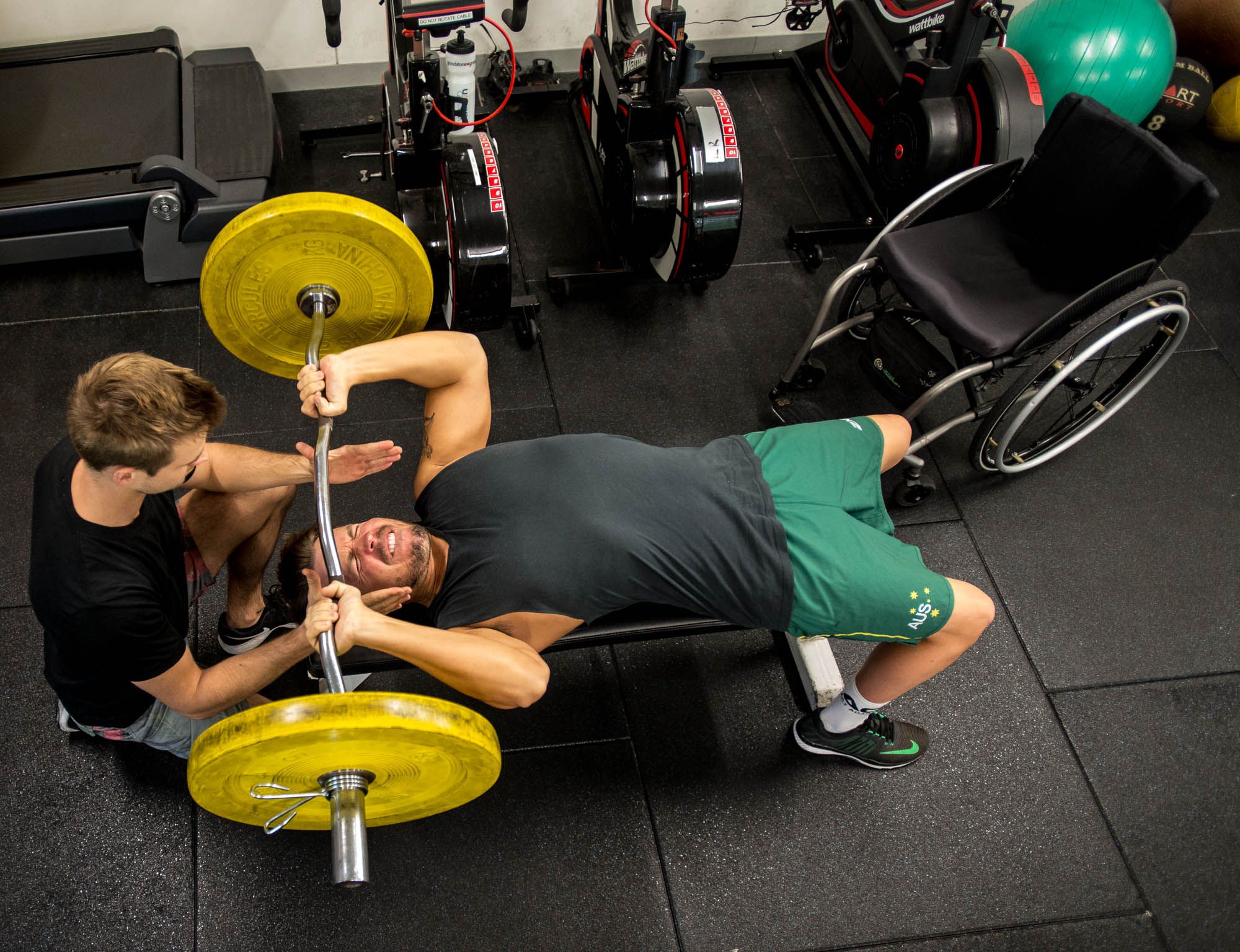Nic Beveridge: Finding Strength and Powering to the Top
Nic Beveridge, an Australian paratriathlete, reflects on his experience and how he had to accept and deal with his condition.

Nic Beveridge, an Australian paratriathlete, reflects on his experience and how he had to accept and deal with his condition.

“All of a sudden, I found it really hard to breathe,” Nic Beveridge, one of Australia’s best paratriathletes told Trizone. “It was term three and I was in year 12. I was on the phone to my mate from water polo and we were bantering when I just started having trouble talking, so I hung up the phone.”
The chatty Beveridge stopped here, remembering the moment with a calm reverence. “I got down the stairs to my parents and my body started spasming,” recalled Nic. “My parents were watching me but I was struggling to talk and breathe, and I was having trouble standing.” With a laugh, Nic shakes off the weight of the memory, adding “it’s a weird sensation when your muscles are spasming against your will.”
Ushered into the car by his parents who were frantic with fear, Beveridge’s memory becomes clouded at this point. His Mum remembers it well though, and told him many years later the one thing he’d said to her during this tortuous car ride; was
“Mum, I think I’m dying.”
Once in hospital, things only got worse. “The spasms had intensified a lot. I had an excruciating pain in my head; like someone was dropping bricks on it. It all started to get a bit too much. I spasmed so much, both my legs shot up in the air and I passed out.”
Nic’s memory is extremely detailed about the moment his life changed forever, but he wasn’t sad or frustrated as he recalled the first morning in hospital. His voice was calm and measured. “There was a bit of light coming in the room,” remembered Nic, “I was lying a bit skew whiff [an Australian phrase for off-centre] and I tried to straighten up in my bed, but I couldn’t.”
“I went to put my head up, but nothing else was moving with it. I went to put a leg out.” Nic’s analytical mind remembered the confusion of that moment; an alien experience; “Within your mind you can say ‘straighten your leg out’ and without looking, you think you’ve done it. When you look down though, nothing has happened.”
In a haze of confusion, Beveridge tried to shout to a nurse he could see through the doorway. “I tried to call out for help, but my diaphragm was affected so I couldn’t yell either.”
Breezing past this memory, you can’t help but consider the gravity of that moment for the keen athlete who’d had his heart set on representing Australia in field hockey. Moving on with a smile though, Nic summed up the 24 hours that changed his life with; “long story short, I was completely paralysed from T4, just below the chest. I’d lost control of my whole abdomen and legs.”
After a brief pause, Nic smiled and added, “that’s how I acquired my disability and how my whole second life started.”
The beginning of that second life was a plunge into an unknown world of tests and confusion. “In the first week, no one could tell me what was going on and why I was suddenly paralysed.” After eight weeks in hospital though, his medical team started to get to the root of his body’s sudden change.
Nic Beveridge’s sudden paralysis was due to transverse myelitis, a condition involving inflammation of the spinal cord caused by a dysfunction in his immune system. “Yeah it’s rare, but it’s not contagious or inherited. It causes fluid in your spinal canal to swell and put pressure on your spinal cord. It’s like you’ve broken your spine but you haven’t,” said Nic. “You have to wait for a few months for the swelling to go down and see what kind of damage was done.”
“I was definitely upset,” said Beveridge, “It was the surprise as much as anything. I was scared too.” Nic stopped and took a breath, “the most upsetting part was I hadn’t done anything to contribute or cause it, it was fully out of my control.”
Nic’s honesty was palpable, and his ability to reflect on his past so clearly shows maturity far beyond his 30 years. “Before it happened to me, I thought ‘how do you even deal with something like that?’ Now though, I realise when anyone is thrown in that situation, you just deal with it. You don’t really have a chance to choose,” said Nic. “The choice is taken away and you just have to go through the process and work out what you’re dealing with and what the next steps are.”

Powerfully mature for his 30 years, Nic Beveridge finally added “you’ve gotta do what you gotta do, you’ve gotta let them do the tests.”
To add to the confusion of his life-changing illness, Nic was suddenly lonely. “It was years before everyone had cell phones. You had to find a computer and email,” laughed Nic. “Once I was transferred to Townsville Hospital and the spinal unit in Brisbane, I didn’t have daily visitors anymore. Some people would call the nurse’s desk and they’d transfer it to my bedside phone. It was hard,” said Nic quietly, adding “I credit it to toughening me up early in my life, much more than if I’d just progressed along the same track I was on.”
“They told me swimming was good for rehab, so I started going to the pool but it was so different. How I floated was different, three quarters of my body didn’t even float initially,” said Nic. “Your mindset is so different, you’re so used to being good at something and knowing the basics of how to do it. Starting over was overwhelming.”
Nic moved back to Mackay after finishing school to adjust to his new body. “I trained with an assistant swimming coach who worked with me one on one. He helped me get a grip on not being good,” said Nic. His mindset though, had completely changed.
“I enjoyed the fitness aspect once I learned how to float, but the hunger and passion to want to beat other people, and more importantly find out how good you can be and beat yourself, wasn’t there anymore.”
“To have that desire gone; all of a sudden sport was different, I just wasn’t interested anymore,” said Nic. “I played two games of wheelchair basketball and didn’t enjoy it at all.
“I decided parasport was not for me.”
“I kept swimming for fitness, but I didn’t compete,” said Beveridge.
By 2012, a few years later, Nic Beveridge’s health had deteriorated due to his disability. “There was nothing I could have done. I had to have invasive surgery to correct the problem, and the recovery was three months of bed rest,” said Beveridge, “they took tissue from my other organs to rebuild some of my insides. Modern medicine is amazing!” laughed Nic.
Confined to his bed with nothing to motivate him to recover, Beveridge watched hours of TV day after day and the London Olympics happened to be on. “I’d never watched the Paralympic Games before. Being stuck in bed though, I thought – why not?”
In the gaps between the events, the TV coverage highlighted the profiles of some of the athletes, and one caught Nic’s eye. “This person had lost their leg to cancer, and however many months later, they’d climbed Mount Kilimanjaro.” That inspiring story was a monumental moment for Nic, and his voice became slow and strong as he recalled it.
Something inside me clicked. It’s the most memorable time in my life that I was inspired.
This one powerful story of an athlete gave Nic a jolt of hope he’d been missing. “I remembered I still had full use of my upper body and I’d not made the most of it,” Nic told Trizone defiantly. “I decided if I recover from the surgery I wanted to make the most of it. I wanted to see what I was capable of.”
While stuck in bed, Nic spent hours on Google. “I typed in something strange like ‘extreme endurance parasport’” smiled Nic. “I wanted something that would test my limits I didn’t think a lot of people would be capable of doing.”
Google’s top result was an article about Bill Chaffey, the then three time world paratriathlon champion (now five time) who was training for Ironman Hawaii, and Nic was hooked. “I read the article about Bill and was so excited to hear about paratriathlon! I decided this was it, I’ve gotta get into this.”
“While I couldn’t get out of bed, I got in touch with Triathlon Queensland and they gave me Bill’s email address. I still have that first email I sent him and his reply,” said Nic. “
To send that first email, and to change his mindset and decide to optimise his physical ability in the face of adversity showed more mental strength than most people are able to summon in a lifetime. The huge importance of this transformation isn’t lost on Beveridge either. “I’m a sentimental type, so the fact Bill and I both went to Rio together with the sport’s Paralympic debut was quite special to me,” Nic told Trizone.

Once he’d recovered from his surgery, Nic dug deep and searched for a hand cycle and racing wheelchair. “Those things aren’t cheep, but I networked and spoke to Triathlon Queensland and Bill, plus Sporting Wheelies to get the right equipment. I loaned a recreational hand cycle and a very old racing wheelchair and that’s how I got started in the sport,” said Nic happily.
Working incredibly hard to get into the brand new paratriathlon world, Nic made huge progress and by 2016 he’d “scraped into the Australian paralympic team for Rio,”although we doubt it was really a scrape as he told us.
In 2015, Nic had reached a plateau in his results,. “Being fresh to hand cycling, using a racing wheelchair and high performance sport, I decided I needed to spend time working with a specialist to learn how to use my equipment before anyone else can help me.”
Fiercely driven, Nic Beveridge relocated to Canberra. “I’d never lived outside Queensland my entire life, but I knew I needed to learn how to be a paratriathlete.” After two years, Nic had learned as much as he possibly could about being a paratriathlete and he headed to Rio where he placed ninth.
“When I got back from Rio, I felt dry and unfulfilled,” said Beveridge, “I had the titles of Paratriathlete and Paralympian, but I didn’t feel like I’d filled them with the meaning they should carry.” Unlike many athletes who would simply revel in the glory of getting to the Games, Beveridge felt he owed it to himself, and to the legacy of the Games, to do better. “I just felt like there was so much more I could do in training, and within myself as an athlete, but I didn’t know what that was,” said Nic.
“Two weeks after I got back, I reached out to Dan Atkins; I knew he was a great guy and a tough coach,” Beveridge told Trizone. “I told him what I wanted to achieve.”
“When my event got added to the Commonwealth Games list I told Dan I wanted to know if I’m capable of fulfilling the title of Paralympian with meaning,” said Nic Beveridge.”
“I wanted to make sure I’d done everything possible, so if my career ended the next day I’d be 100 percent satisfied I’d made the most of it and pushed myself as hard as I could,” Beveridge told Trizone.
“Training with Dan and the squad, it’s everything I needed without knowing I needed it. It was the fulfilment I was looking for,” said Nic. “The training is tough; it really makes you earn your place and keep it.”
Learning from the entire squad is what keeps Beveridge motivated. “I couldn’t be happier with the training environment I’m in, also learning from the able bodied athletes who are younger than me, but they’ve been in the sport a lot longer,” said Nic.
Listening to Nic Beveridge chat about his training colleagues, you can’t help but smile at the admiration and respect the paratriathlete has for his friends. “It blows my mind, the level of commitment they have at that age. Their drive and the support they have for one another, even though they’re in direct competition with each other, there’s just no animosity. Learning that training ethic has taken me to another level,” said Nic.
“It’s more about just showing up; what I love is when I turn up, everyone is there and everyone’s getting ready. No one says they don’t want to be there, they’re all really positive,” said Nic purposefully.
“When Dan says what we’re going to do, you can think ‘wow what a set,’ but no one complains. There’s no one who brings the squad down. You don’t want to be that person who doesn’t contribute to the squad in training,” Nic told Trizone, his commitment to his sport and his squad shining through his words.
“My results this season have gone up and up. I finished within 47 seconds of Bill Chaffy in Yokohama which is a big accomplishment,” said Nic, adding Chaffy had beaten him by nine minutes at Rio.
“Now, none of us in the squad fear racing. The training we do is much harder than racing. When you get to the racing, you know your job. I’m very happy and comfortable that we’re on a good path towards doing the best we can to earn selection for the Commonwealth Games.”
Nic’s eyes are set fully on the future and just listening to him discuss what’s on his horizon is inspiring. “If we are selected for the Games, we’ll be in a really good position to get a medal as well,” Beveridge told Trizone. Unfortunately the day we spoke, Nic was very unwell and had been unable to travel to Edmonton for the third round of the World Paratriathlon Series.
Nic Beveridge’s journey, like any athlete, has been in fierce pursuit of constant improvement, but that’s just the half of it. His mind-blowing transformation from being frustrated after his surgery and having his back turned on professional sport to becoming one of Australia’s top Paralympic triathletes is beyond inspiring. Now all eyes are on Beveridge to see how he goes for Commonwealth Games selection.